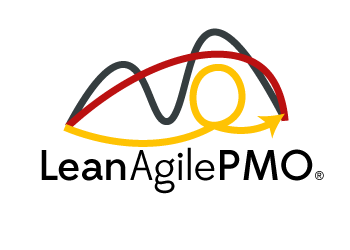The Lean-Agile PMO
Virtual Classroom Price: £1050 + VAT
Virtual Classroom Timings: 9am to 4pm UK time each day
The course is designed for PMOs and senior change stakeholders as they make the changes necessary to support agile and traditional projects, programmes and portfolios.
The Lean-Agile PMO course enables participants to understand or predict the impacts of Agile on a PMO. Many organisations will find themselves operating with a hybrid portfolio consisting of waterfall activities, Agile activities and some continuous delivery activities. This course outlines how the PMO should adapt itself to support the hybrid portfolio.
Many PMO’s operate as a centre of excellence for initiative delivery as such they design the project delivery framework and artefacts. This course outlines the differences between the frameworks which are used to scale Agile and SCRUM to cater for more substantial activities.
This open two-day interactive course, delivered using virtual classroom technology or in a traditional classroom is designed for Senior PMO Managers, PMO Leads, PMO Analysts, and Heads of Change, who wish to introduce a Lean-Agile PMO concept. Alternatively, this course can be tailored to the needs of a single customer when it can be used as a component of a transformation to Agile.
The Lean-Agile Concept
Some PMOs have difficulty in defining the organisational value they create. The PMO may be seen as predominantly a reporting or administration function. This is a course that outlines a design for a PMO using Lean and Agile concepts. The design is focussed on the delivery of maximum value to the PMO’s customers (stakeholders) with as little wasted effort as possible. It facilitates project execution such that wasted project effort is also minimised. It defines a service ethos and a mechanism for continuous improvement.
Using Agile techniques, the PMO provides a project ecosystem and collaborative culture such that projects are demonstrably delivered as fast as possible, irrespective of delivery methodology, with “just enough” governance so that risks are well managed and success is assured. The Lean-Agile PMO concept shifts the emphasis of the function from simply reporting to providing essential services and preventing activities from going wrong.
 The course outlines the process and capability changes needed to up-shift the PMO function providing a purposeful governance framework for both agile and traditional projects and programmes. This framework outlines the agile PMO events and ceremonies. It includes agile risk management, Red-Amber-Green Status analysis, agile checkpoints and status reporting.
The course outlines the process and capability changes needed to up-shift the PMO function providing a purposeful governance framework for both agile and traditional projects and programmes. This framework outlines the agile PMO events and ceremonies. It includes agile risk management, Red-Amber-Green Status analysis, agile checkpoints and status reporting.
Course Objectives
The course outlines the principles of agile portfolio management and portfolio reporting. Following this course participants will:
- Understand how a PMO should function to support agile and traditional projects and programmes.
- Understand the critical differences between the Agile Frameworks and the essential factors influencing their selection.
- Recognise how the PMO needs to adapt and support each of the Frameworks. Be aware of the team roles in agile programmes and projects.
- Understand the project to product concept and the metrics used to evaluate value-stream performance.
- Understand how metrics are used in planning, analysis and reporting agile activities.
- Be able to evaluate the suitability of Risk Management strategies in the agile context.
- Evaluate the status of agile projects using Red Amber Green analysis.
Course Overview
Over the course of two days, learners will cover:
- What is Agile? – introduction to Scrum and Kanban
- Agile roles and responsibilities
- Designing a PMO to add value in a hybrid context
- Why Agile portfolio management matters
- Minimum Business Increment
- Introducing the main Agile Frameworks
- Project to Product
- Agile reporting


